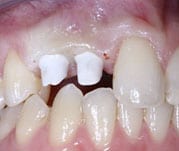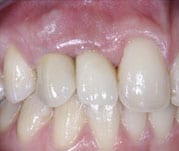
Some Belmont residents, especially seniors, lose a significant amount of teeth over the years. Others may have decayed teeth that need to be extracted, misaligned teeth, or teeth with exposed roots due to untreated gum recession. For these patients to restore the functionality and aesthetics of teeth, a full mouth dental reconstruction may be required. But it’s important to note that no two full mouth dental reconstruction procedures are alike. The specific procedures and treatments needed vary patient to patient, depending on their unique needs and wishes for functionality and aesthetics. Read on to learn about the different procedures that can accomplish a full mouth dental reconstruction, to help determine which procedure might be right for you.
• Option 1: Dental Implants
Dental implants are perhaps the strongest and most permanent method for a full mouth dental reconstruction. With dental implants, a titanium “root” is placed in the jawbone, and tooth-looking crowns are placed over the implants, restoring the aesthetics. Because dental implants use titanium rods to “root” into the jawbone, they restore a significant amount of functionality, too, meaning that you can continue to eat your favorite foods.
The crowns for dental implants can take on many shapes and forms. For example, people needing to replace a few teeth might have one dental implant per tooth that needs to be replaced. But for a full mouth dental reconstruction, as few as four dental implants can be used to attach upper or lower arches of crowns, restoring both your teeth’s functionality and aesthetic appearance. Implants are also popular because they tend to prevent bone resorption.
• Option 2: Dentures
Dentures are a less expensive option than dental implants. With dentures, Belmont patients have full arches of upper and lower, artificial teeth created. These teeth are removable. Most patients adapt well to traditional upper denture due to the suction that is created between the palate and denture base. Lower denture often require adhesive that can be bought over the counter.
While dentures are a popular full mouth dental reconstruction option, they do come with some drawbacks. First, since they are removable, they can accidentally move while you are eating and chewing. This means that you may not be able to continue eating all of your favorite foods. Second, they tend not to prevent against bone resorption.
• Option 3: Crowns
Dental crowns are often provided to restore natural tooth crown damaged by decay of fracture. Some people may desire a better-looking smile. With crowns, your prosthodontist will reshape your tooth or teeth so that the tooth-shaped crown can fit over it. He or she will then take an impression of your tooth for your permanent crown, and place a temporary crown over your tooth. Once the permanent crown is created, it will be inserted and replace the appearance and function of your tooth, or if needed, teeth.
• Option 4: Bridges
If you have gaps of missing teeth, then dental bridges may be the dental reconstruction option for you. Dental bridges are a series of three or more connecting crowns. The end crowns are placed on your existing teeth, while the middle crowns fill in the gaps left by your missing teeth. The result is a more aesthetically pleasing smile, and the added functionality of new tooth function via the new crowns.
• Option 5: Porcelain Veneers
For some Belmont residents, only the front of the teeth are affected. For these Belmont patients, porcelain veneers may be an option. Porcelain veneers, which are often placed over misaligned or discolored teeth, are man-made “shells” that go over the front of your teeth and can be color matched to your other, natural teeth.
I’d Like to Discuss My Full Mouth Dental Reconstruction Options
If you need a full mouth dental reconstruction and you would like to determine which procedure is right for you, schedule an appointment with the Belmont Dental Restorative Group today by calling (617) 489-1470. During this appointment, your prosthodontist will perform a full examination and help you determine which procedure is right for you.






